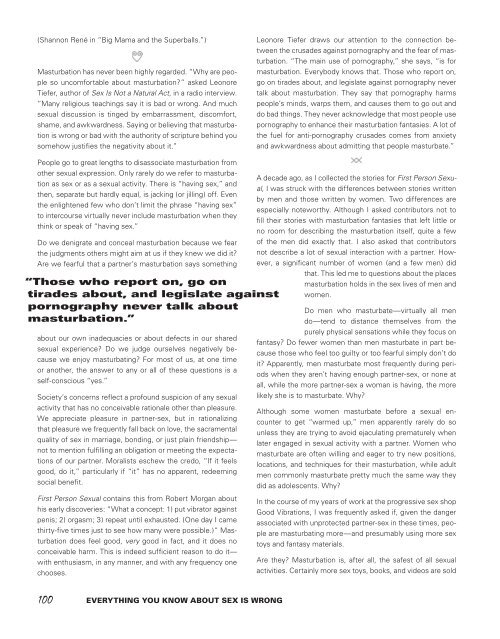Create successful ePaper yourself
Turn your PDF publications into a flip-book with our unique Google optimized e-Paper software.
(Shannon René in “Big Mama and the Superballs.”)<br />
Masturbation has never been highly regarded. “Why are people<br />
so uncomfortable about masturbation?” asked Leonore<br />
Tiefer, author of Sex Is Not a Natural Act, in a radio interview.<br />
“Many religious teachings say it is bad or wrong. And much<br />
sexual discussion is tinged by embarrassment, discomfort,<br />
shame, and awkwardness. Saying or believing that masturbation<br />
is wrong or bad with the authority of scripture behind you<br />
somehow justifies the negativity about it.”<br />
Leonore Tiefer draws our attention to the connection between<br />
the crusades against pornography and the fear of masturbation.<br />
“The main use of pornography,” she says, “is for<br />
masturbation. Everybody knows that. Those who report on,<br />
go on tirades about, and legislate against pornography never<br />
talk about masturbation. They say that pornography harms<br />
people’s minds, warps them, and causes them to go out and<br />
do bad things. They never acknowledge that most people use<br />
pornography to enhance their masturbation fantasies. A lot of<br />
the fuel for anti-pornography crusades comes from anxiety<br />
and awkwardness about ad mitting that people masturbate.”<br />
People go to great lengths to disassociate masturbation from<br />
other sexual expression. Only rarely do we refer to masturbation<br />
as sex or as a sexual activity. There is “having sex,” and<br />
then, separate but hardly equal, is jacking (or jilling) off. Even<br />
the enlightened few who don’t limit the phrase “having sex”<br />
to intercourse virtually never include masturbation when they<br />
think or speak of “having sex.”<br />
Do we denigrate and conceal masturbation because we fear<br />
the judgments others might aim at us if they knew we did it?<br />
Are we fearful that a partner’s masturbation says something<br />
“Those who report on, go on<br />
tirades about, and legislate against<br />
pornography never talk about<br />
masturbation.”<br />
about our own inadequacies or about defects in our shared<br />
sexual experience? Do we judge our selves negatively because<br />
we enjoy masturbating? For most of us, at one time<br />
or another, the answer to any or all of these questions is a<br />
self-conscious “yes.”<br />
Society’s concerns reflect a profound suspicion of any sexual<br />
activity that has no conceivable rationale other than pleasure.<br />
We appreciate pleasure in partner-sex, but in rationalizing<br />
that pleasure we frequently fall back on love, the sacramental<br />
quality of sex in marriage, bonding, or just plain friendship—<br />
not to mention fulfilling an obligation or meeting the expectations<br />
of our partner. Moralists eschew the credo, “If it feels<br />
good, do it,” particularly if “it” has no apparent, redeeming<br />
social benefit.<br />
A decade ago, as I collected the stories for First Person Sexual,<br />
I was struck with the differences between stories written<br />
by men and those written by women. Two differences are<br />
especially noteworthy. Although I asked contributors not to<br />
fill their stories with masturbation fantasies that left little or<br />
no room for describing the masturbation itself, quite a few<br />
of the men did exactly that. I also asked that contributors<br />
not describe a lot of sexual interaction with a partner. However,<br />
a significant number of women (and a few men) did<br />
that. This led me to questions about the places<br />
masturbation holds in the sex lives of men and<br />
women.<br />
Do men who masturbate—virtually all men<br />
do—tend to distance themselves from the<br />
purely physical sensations while they focus on<br />
fantasy? Do fewer women than men masturbate in part because<br />
those who feel too guilty or too fearful simply don’t do<br />
it? Apparently, men masturbate most frequently during periods<br />
when they aren’t having enough partner-sex, or none at<br />
all, while the more partner-sex a woman is having, the more<br />
likely she is to masturbate. Why?<br />
Although some women masturbate before a sexual encounter<br />
to get “warmed up,” men apparently rarely do so<br />
unless they are trying to avoid ejaculating prematurely when<br />
later engaged in sexual activity with a partner. Women who<br />
masturbate are often willing and eager to try new positions,<br />
locations, and techniques for their masturbation, while adult<br />
men commonly masturbate pretty much the same way they<br />
did as adolescents. Why?<br />
First Person Sexual contains this from Robert Morgan about<br />
his early discoveries: “What a concept: 1) put vibrator against<br />
penis; 2) orgasm; 3) repeat until exhausted. (One day I came<br />
thirty-five times just to see how many were possible.)” Masturbation<br />
does feel good, very good in fact, and it does no<br />
conceivable harm. This is indeed sufficient reason to do it—<br />
with enthusiasm, in any manner, and with any frequency one<br />
chooses.<br />
In the course of my years of work at the progressive sex shop<br />
Good Vibrations, I was frequently asked if, given the danger<br />
associated with unprotected partner-sex in these times, people<br />
are masturbating more—and presumably using more sex<br />
toys and fantasy materials.<br />
Are they? Masturbation is, after all, the safest of all sexual<br />
activities. Certainly more sex toys, books, and videos are sold<br />
100 EVERYTHING YOU KNOW ABOUT SEX IS <strong>WRONG</strong>


